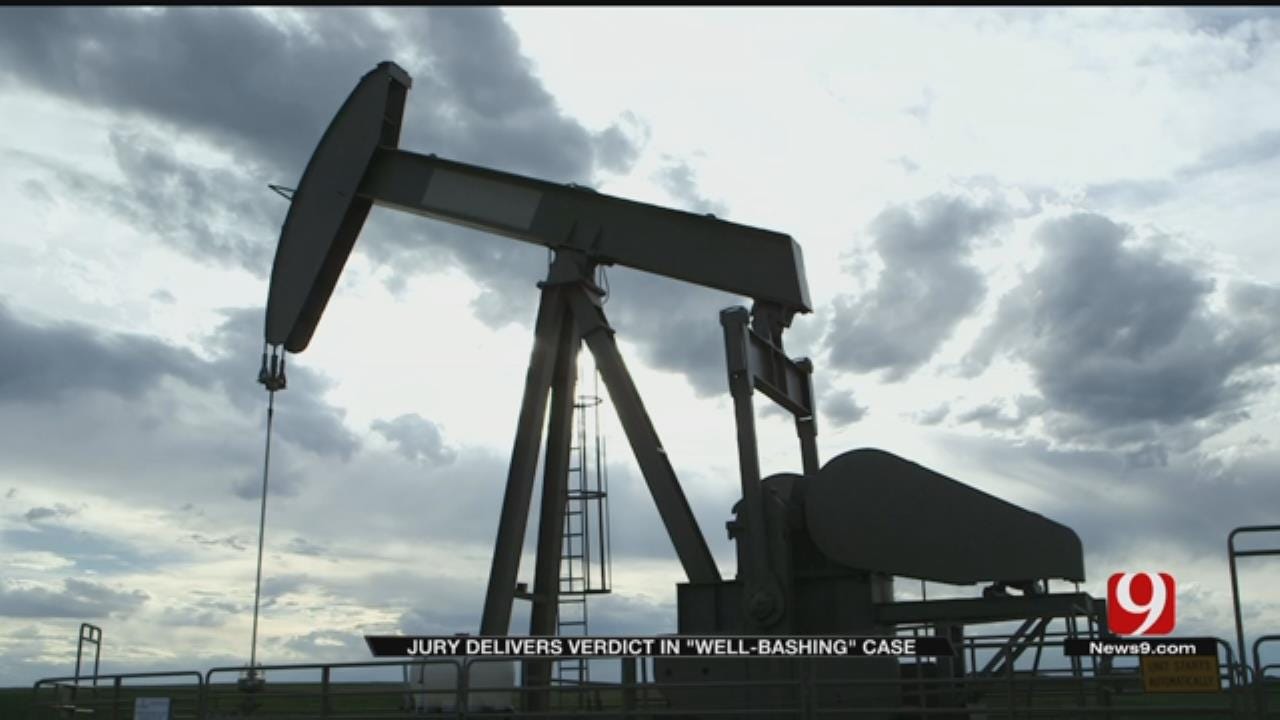Jury Delivers Verdict In Oklahoma 'Well-Bashing' Case
<p>A U.S. District Court jury delivered a verdict last month that is rippling through the state's oil and gas industry. </p>Friday, September 1st 2017, 10:07 pm
A U.S. District Court jury delivered a verdict last month that is rippling through the state's oil and gas industry.
The verdict was in favor of the owner of an old vertical well who had sued a large, independent producer for severely damaging his well during a horizontal frac job.
Such incidents, known within the industry as "well-bashing," seem to be becoming increasingly common, which is why other vertical well owners hope this case will set a precedent, or at least send a strong message to the big horizontal drillers.
"The vertical wells can't stand the fracs that they're putting on these," said Andy Sheen, the Edmond man who brought the lawsuit.
Sheen says he owns about a half-dozen vertical wells, mostly low production stripper wells similar to one he was checking on recently in Piedmont. The wells are his livelihood, which is why the phone call he got two years ago from a representative of a company drilling near him in Blaine County caused such concern.
"And he called and he said, 'We fracked into your--we think we fracked into your well'," recalled Sheen, "and I said, 'Do what?'"
It appeared that the company, Denver-based Felix Energy, in completing a new horizontal well near Sheen's vertical well, caused the casing to collapse at a depth of 4,700 feet, cutting off what Sheen says had been a modest, but steady flow of oil and gas.
Sheen says it was the third time one of his wells had been the victim of a frac hit. He says others have lost more wells than he has, but they have been unwilling to take the oil and gas companies, with their deep pockets, to court.
"They eat ya up with attorney’s fees, and people are just afraid, if they lose, it'll break 'em," Sheen explained. "I know I was, but I'd had enough."
Sheen filed a civil suit in U.S. District Court (Western District of Oklahoma), naming Felix in three counts: private nuisance, subsurface trespass, and negligence. Eschewing a settlement offer from Devon Energy, which acquired Felix's STACK assets shortly after the lawsuit was filed, Sheen took the case to trial, three weeks ago, and won.
Jurors ruled in favor of Sheen on the private nuisance and subsurface trespass counts; the negligence count was thrown out. Devon was ordered to pay $220,000 in damages.
"I do believe it will help," said Joe Warren, who owns dozens of vertical wells and is a member of the newly-formed Oklahoma Energy Producers Alliance (OEPA).
Warren says more than twenty of his company's wells, most of them in Kingfisher County, have been damaged or destroyed by horizontal frac jobs. He believes the judgment against Devon/Felix may lead to more small operators filing lawsuits. More than that, though, he hopes it will raise general awareness of the 'well-bashing' problem and ultimately help ensure the correlative rights of all stakeholders are protected.
"That's not happening right now," Warren insisted, "and there needs to be a change in practice at the Corporation Commission and a change of rules, if necessary."
Officials with the Oklahoma Oil and Gas Association (OKOGA) disagree, in part.
"There's been this notion that somehow these wells are being damaged with no recourse," said Chad Warmington, OKOGA President, "and I don't think that that's the case."
OKOGA is an industry advocacy group whose members include Devon and many of the larger oil and gas companies that are doing much of the horizontal drilling in Oklahoma. Warmington says the horizontal wells his members are drilling are good for Oklahoma and, generally, good for all those with correlative rights.
Still, Warmington acknowledges the system could stand some tweaking.
"Technology is advancing so quickly, regulation hasn't caught up, the process hasn't quite come together," Warmington stated, "but I'm pretty confident, based on our large members who are the most active in the state, they want to figure out a way to make this work better for everybody."
Some of the frac interference cases are being settled privately, but Warmington understands that many small owners and operators feel there should be a better way to compensate them fairly when their wells are damaged.
"I think we agree with them, and want to come up with a process that helps to do that," Warmington explained. "So, I don't think you'll see a bunch more lawsuits-- I think what you'll see is the Commission evolve its practices."
The Oklahoma Corporation Commission, which regulates all drilling in the state, is currently gathering data on frac interference so that permitting guidelines might be tweaked, but commissioners say determining compensation for damaged wells is not in their purview.
"While we can set policy that may affect the way in which future wells are drilled," said Commissioner Todd Hiett, "we don't have jurisdiction, in terms of awarding damages or setting values on wells,"
Hiett says the Commission's biggest concern right now, with regard to the well-bashing incidents, is the potential for harm to the environment -- contamination of groundwater. He says they need more data on these events and thus are urging vertical well owners who feel they've been fracked into to report it to them.
More Like This
September 1st, 2017
November 13th, 2024
October 28th, 2024
October 17th, 2024
Top Headlines
December 27th, 2024
December 27th, 2024
December 27th, 2024
December 27th, 2024










